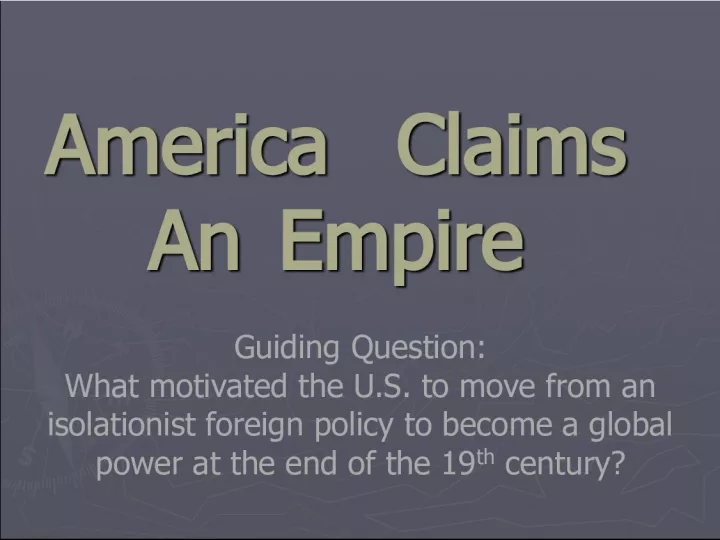America's Shift from Isolationism to Global Power


This article explores the motivation behind the United States' shift from an isolationist foreign policy to asserting their power as a global superpower at the end of the 19th century
- Uploaded on | 1 Views
-
 elijahwilson
elijahwilson
About America's Shift from Isolationism to Global Power
PowerPoint presentation about 'America's Shift from Isolationism to Global Power'. This presentation describes the topic on This article explores the motivation behind the United States' shift from an isolationist foreign policy to asserting their power as a global superpower at the end of the 19th century. The key topics included in this slideshow are . Download this presentation absolutely free.
Presentation Transcript
Slide1America Claims An Empire America Claims An Empire Guiding Question: What motivated the U.S. to move from an isolationist foreign policy to become a global power at the end of the 19 th century?
Slide2What do you think this cartoon suggests about the United States? What do you think this cartoon suggests about the United States? Cuba Cuba
Slide3Isolationist to Global Power Isolationist to Global Power ► In his 1796 Farewell Address, President Washington cautioned Americans to “steer clear of permanent alliances.” ► In his 1796 Farewell Address, President Washington cautioned Americans to “steer clear of permanent alliances.” ► This warning became a theme of government policy for the next 100 years, but in the late 1800s, Americans began looking outward to the larger world. ► This warning became a theme of government policy for the next 100 years, but in the late 1800s, Americans began looking outward to the larger world.
Slide4Isolationist to Global Power Isolationist to Global Power What do you think caused the U.S. to become more involved in world affairs during this time after the Civil War? What do you think caused the U.S. to become more involved in world affairs during this time after the Civil War?
Slide5VocabularyVocabulary ► ISOLATIONISM : a policy of pulling away from involvement in world affairs ► ISOLATIONISM : a policy of pulling away from involvement in world affairs
Slide6VocabularyVocabulary ► MONROE DOCTRINE : an 1823 warning to all outside powers not to interfere with Affairs in the Western Hemisphere. ► MONROE DOCTRINE : an 1823 warning to all outside powers not to interfere with Affairs in the Western Hemisphere.
Slide7VocabularyVocabulary ► NEUTRALITY : refusal to take part in a war between other nations ► NEUTRALITY : refusal to take part in a war between other nations
Slide8VocabularyVocabulary ► EXPANSIONISM : a nation's practice or policy of territorial or economic growth ► EXPANSIONISM : a nation's practice or policy of territorial or economic growth
Slide9VocabularyVocabulary ► IMPERIALISM : the policy in which stronger nations extend their economic, political or military control over weaker territories ► IMPERIALISM : the policy in which stronger nations extend their economic, political or military control over weaker territories
Slide10Foreign Policy vs. Domestic Policy Foreign Policy vs. Domestic Policy ► A country’s dealings with another country ► A country’s dealings with another country ► Outside the country ► Outside the country ► Examples: ► Examples: Isolationism Isolationism Expansionism Expansionism Imperialism Imperialism Neutrality Neutrality ► Internal affairs or dealings of a country ► Within a country ► Examples: Progressive Reformers
Slide11►What does the eagle symbolize? ► What does the eagle symbolize? ► What point does the cartoonist make in portraying this eagle with outstretched wings? ► What point does the cartoonist make in portraying this eagle with outstretched wings?
Slide12American Imperialism American Imperialism
Slide13What motivated U.S. imperialism? 1. Political : Desire for Military Strength What motivated U.S. imperialism? 1. Political : Desire for Military Strength ► European imperialists had been competing for colonies around the world while the U.S. had remained focused on domestic affairs ► European imperialists had been competing for colonies around the world while the U.S. had remained focused on domestic affairs ► Seeing that other nations were establishing global military presence, US leaders pushed to build its own military strength ► Seeing that other nations were establishing global military presence, US leaders pushed to build its own military strength
Slide15What motivated U.S. imperialism? 2. Economic : Thirst for New Markets What motivated U.S. imperialism? 2. Economic : Thirst for New Markets ► Need raw materials for new factories during Industrial Age ► Need raw materials for new factories during Industrial Age ► Overproduction of food/goods (technology allowed farmers to produce more food than Americans could consume) ► Overproduction of food/goods (technology allowed farmers to produce more food than Americans could consume) ► Influx of immigrants leads to unemployment and economic depression ► Influx of immigrants leads to unemployment and economic depression
Slide16What motivated U.S. imperialism? 3. Social : Cultural/Religious Superiority What motivated U.S. imperialism? 3. Social : Cultural/Religious Superiority ► Social Darwinism ► Social Darwinism Free market competition would lead to survival of the fittest Free market competition would lead to survival of the fittest Belief in racial superiority of Anglo Saxons Belief in racial superiority of Anglo Saxons ► “White Man’s Burden” ► “White Man’s Burden” US had responsibility to spread Christianity and “civilization” to world’s inferior people who couldn’t rule themselves US had responsibility to spread Christianity and “civilization” to world’s inferior people who couldn’t rule themselves Pears' Soap McClure's Magazine (Oct. 1899). The first step towards lightening the White Man's Burden is through teaching the virtues of cleanliness. Pears' Soap is a potent factor in brightening the dark corners of the earth as civilization advances, while amongst the cultured of all nations it holds the highest place -- it is the ideal toilet soap.
Slide17…Coming Tomorrow…The Spanish-American War… …Coming Tomorrow…The Spanish-American War… Cuba Cuba